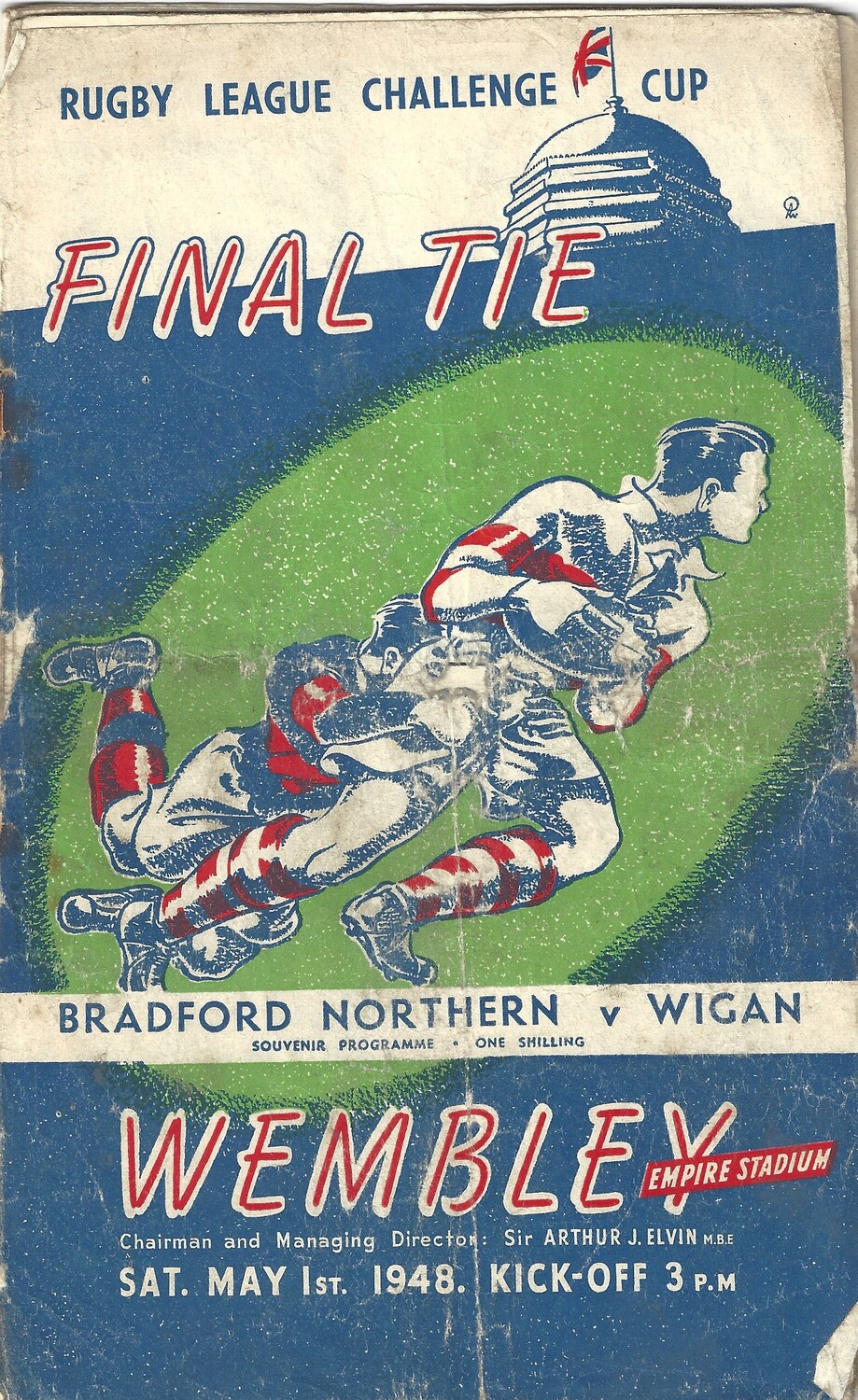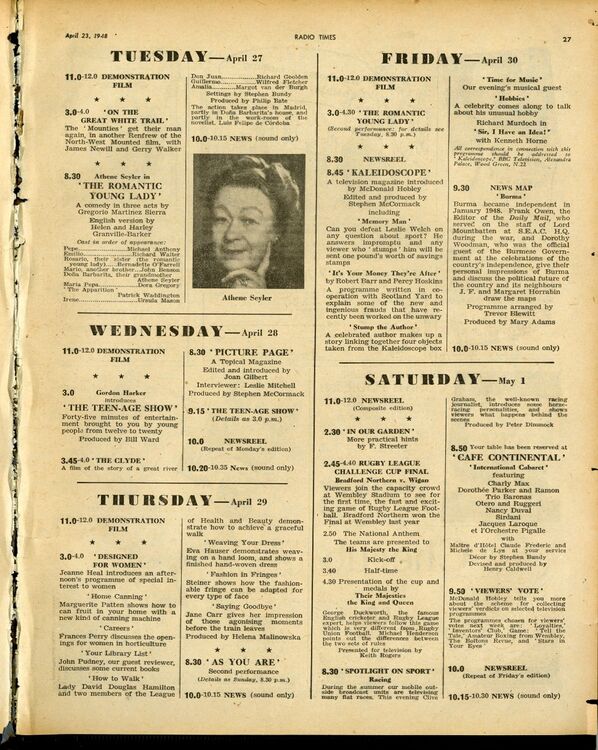1948 Challenge Cup Final (partially found footage of rugby league game; 1948)
The 1948 Challenge Cup Final culminated the 47th running of the Rugby Football League Challenge Cup. Occurring on 1st May in front of 91,465 at Wembley Stadium, the encounter saw Wigan defeat defending champions Bradford Northern 8-3 to claim its third Challenge Cup, and its first since 1929. The game is also significant for becoming the first rugby league match to be broadcast live on television.
Background
The Challenge Cup remains the oldest knockout rugby league cup competition, with the first final occurring in 1897.[1][2][3] Since 1929, the Final has mainly been hosted at Wembley Stadium, primarily to add to the trophy's prestige.[4][1][2] Bradford Northern entered the tournament as defending champions; their road to the Final saw the team defeat Huddersfield, Wakefield, Oldham, and Hunslet.[5][3] Meanwhile, Wigan overcame Castleford, Leeds, Warrington, and Rochdale to reach the Final, seeking their third title and their first in 19 years.[6][3] Bradford was eyeing a fourth cup, in addition to achieving their first title defence.[3]
The Final took place on 1st May.[7][8] With 91,465 fans packing the Wembley Stadium stands, it was then the highest-ever attendance for a Challenge Cup Final.[8][7][3] King George VI was present at Wembley, becoming the first reigning monarch to attend a major rugby league game.[9][10][8] Previously, he had witnessed a schoolboy match held on 23rd November 1932 at Wigan and had been routinely invited to attend the Challenge Cup Final since 1929.[8][9] He did accept an invitation for the 1933 edition but later pulled out because of the poor weather that day.[9] The game itself was a close affair, with Wigan narrowly edging out Bradford by two points throughout much of the clash.[8] Frank Whitcombe, serving as a prop for Bradford, helped keep his side in contention courtesy of his "sure handling and shrewd kicking".[8] Alas, despite some strong Bradford charges within the final ten minutes, Wigan sealed an 8-3 victory thanks to a second try.[8][7][3][6]
Wigan was captained by Joe Egan.[11][10] He, therefore, became the first player to receive the trophy and winner's medal from a reigning monarch.[11][10] While Wigan were the victors on the day, Whitcombe's efforts did not go unnoticed, resulting in him receiving the Lance Todd Trophy for being the man-of-the-match.[12][8] Whitcombe earned the dubious honour of becoming the first player to win said trophy for a losing side.[8][12] Still, a year on, Bradford would earn their fourth Challenge Cup, defeating Halifax 12-0.[3] Following this, Bradford did not win another title until 2000, now as Bradford Bulls.[3] The Bulls would also win the 2003 edition, their last as of 2023.[3] Meanwhile, Wigan's next Challenge Cup win was in 1951, when they beat Barrow 10-0.[3][6] Since then, Wigan Warriors has become synonymous with Challenge Cup glory, winning 20 titles as of 2023, helped primarily by a famous winning streak from 1988 to 1995.[3][6][1]
Television Coverage
During the Final's build-up, it was confirmed that the BBC was interested in televising the occasion.[13][14][15][16] Rugby league suffered a tumultuous early relationship with the broadcaster.[14] Like with most sports, rugby league received its first live British radio coverage in 1927, when the BBC covered that year's Challenge Cup Final between Oldham and Swinton.[17][14][3] However, most affiliated organisations, including the Rugby Football League (the RFL), began accusing the corporation of favouring rugby union over rugby league.[14] Particularly, the RFL were aghast over how rugby league results were seldom broadcast on radio compared to football and rugby union, criticism that carried over into BBC's early television news coverage.[14] Likewise, some within the BBC were rumoured to have questioned the importance of covering rugby league in general.[14] This may explain why inaugural rugby league television coverage took longer to materialise in Britain compared to other sports.[18][13][14] In comparison, rugby union's first live game was a 1938 Calcutta Cup clash.[19]
According to Issue 1,280 of Radio Times, the entirety of the match was televised.[15][16] This included a rendition of the national anthem and the presentation of the winner's medals and trophy by King George VI and Queen Elizabeth.[15][16] The BBC was hoping this new-to-television sport would appeal in an era where sports and television were recovering from the Second World War's aftermath.[13] However, concern arose that rugby league, a sport traditionally popular in the north of England but not so further south, would appear confusing to those exclusively familiar with rugby union.[13] Thus, alongside former cricketer George Duckworth, the commentary was provided by BBC producer Michael Henderson, who helped explain the differences between rugby league and union to viewers.[13][15][16] Some sources claim that the unusual decision was made to broadcast the game exclusively in Birmingham or the entire Midlands.[14] However, this was seemingly impossible, as the Midlands only started receiving regular television in 1949 following the erection of a transmitter in Sutton Coldfield.[20][21] The Final most likely only aired in London, due to BBC Television Service's limited signal range prior to 1949.[20][21]
Following this inaugural coverage, the BBC would cover the second test game between Great Britain and New Zealand on 10th November 1951, which also proved historic for being the first outside broadcast to occur in the entire north of England.[22][13][14] The next Challenge Cup Final to be televised was the 1952 edition between Workington Town and Featherstone Rovers.[23][22][3] However, this further strained BBC-RFL relations, as the latter baulked at the reduced attendance at Wembley that year, believing over-exposure on live television was generally harming rugby league's future.[22][14][13] Thus, the Challenge Cup did not receive regular television coverage until 1958, when it became clear television did not generally limit attendance figures.[23][14] Over in Australia, the first rugby league game to receive live coverage was between the North Sydney Bears and Balmain Tigers on 15th April 1961.[24]
Availability
The 1948 Challenge Cup Final was televised in an era where telerecordings seldom occurred, with regular recordings having not materialised until the perfection of videotape in the mid-to-late-1950s.[25][26] In 1948, the BBC did partially record the London Games' Opening Ceremony, and on 30th November 1949, the corporation partially recorded the England-Italy international football match.[25][21] Alas, considering the Final occurred before these events, and the primitive nature of telerecording prior to 1956 at the BBC, it is highly unlikely any footage of it survived.[25][26][21] Nevertheless, some game highlights can be viewed courtesy of newsreels.
Gallery
Videos
Image
See Also
- 1924 NSWRFL Premiership Final (lost radio coverage of rugby league game; 1924)
- 1927 Challenge Cup Final (lost radio coverage of rugby league game; 1927)
- 1954 Rugby League World Cup Final (partially found footage of international rugby league game; 1954)
- Christchurch vs High School Old Boys (lost radio coverage of charity rugby game; 1926)
- England 11-9 Wales (lost radio coverage of Five Nations Championship game; 1927)
- England 16-21 Scotland (partially found footage of Home Nations Championship game; 1938)
- Great Britain 20-19 New Zealand (partially found footage of international rugby league game; 1951)
- North Sydney Bears 19-21 Balmain Tigers (lost footage of NSWRFL Premiership season game; 1961)
- Scotland 21-13 England (lost radio coverage of Five Nations Championship game; 1927)
References
- ↑ 1.0 1.1 1.2 Archived Rugby Football League summarising the Challenge Cup. Retrieved 6th Sep '23
- ↑ 2.0 2.1 Independent providing a timeline of key rugby league events. Retrieved 6th Sep '23
- ↑ 3.00 3.01 3.02 3.03 3.04 3.05 3.06 3.07 3.08 3.09 3.10 3.11 3.12 Rugby League Project listing the winners of every Challenge Cup. Retrieved 6th Sep '23
- ↑ Archived BBC Sport summarising the Challenge Cup's history and being staged at Wembley since 1929. Retrieved 6th Sep '23
- ↑ Rugby League Project summarising the 1947 Challenge Cup Final. Retrieved 6th Sep '23
- ↑ 6.0 6.1 6.2 6.3 Rugby League Project detailing Wigan Warriors' trophy cabinet. Retrieved 6th Sep '23
- ↑ 7.0 7.1 7.2 Archived Rugby Football League summarising the result and attendance of the Final. Retrieved 6th Sep '23
- ↑ 8.0 8.1 8.2 8.3 8.4 8.5 8.6 8.7 8.8 Firsts, Lasts & Onlys: Rugby summarising the game and the non-television history it made. Retrieved 6th Sep '23
- ↑ 9.0 9.1 9.2 Rugby League in Twentieth Century summarising the efforts to get a reigning royal monarch to attend a rugby league game. Retrieved 6th Sep '23
- ↑ 10.0 10.1 10.2 At the George: And Other Essays on Rugby League summarising King George VI's appearance at the Final. Retrieved 6th Sep '23
- ↑ 11.0 11.1 The Wigan Warriors Miscellany noting Egan became the first to receive the trophy from a royal monarch. Retrieved 6th Sep '23
- ↑ 12.0 12.1 BBC Sport summarising winners of the Lance Todd Trophy from losing teams. Retrieved 6th Sep '23
- ↑ 13.0 13.1 13.2 13.3 13.4 13.5 13.6 BBC Sport in Black and White detailing the BBC's coverage of the Final, and the concerns about covering it. Retrieved 6th Sep '23
- ↑ 14.00 14.01 14.02 14.03 14.04 14.05 14.06 14.07 14.08 14.09 14.10 Rugby League in Twentieth Century detailing rugby league's troubled early relationship with the BBC, how the television coverage was merely restricted to Birmingham, and future broadcasts. Retrieved 6th Sep '23
- ↑ 15.0 15.1 15.2 15.3 BBC Genome archive of Radio Times issues detailing the BBC's coverage of the Final. Retrieved 6th Sep '23
- ↑ 16.0 16.1 16.2 16.3 Issue 1,280 of Radio Times listing the coverage of the Final. Retrieved 6th Sep '23
- ↑ BBC Genome archive of Radio Times issues detailing the radio coverage of the 1927 Challenge Cup Final. Retrieved 6th Sep '23
- ↑ Archived RFL noting the match was the first rugby league game to receive live television coverage. Retrieved 6th Sep '23
- ↑ SWLondoner summarising the 1938 Calcutta Cup and its television significance. Retrieved 6th Sep '23
- ↑ 20.0 20.1 Transdiffusion detailing television coming to the Midlands in 1949. Retrieved 6th Sep '23
- ↑ 21.0 21.1 21.2 21.3 BBC Genome Blog noting BBC Television Service's range was limited until 1949. Retrieved 6th Sep '23
- ↑ 22.0 22.1 22.2 Transdiffusion summarising rugby league's inconsistent history on television, and the RFL's concern over television's impact on ground attendance. Retrieved 6th Sep '23
- ↑ 23.0 23.1 Total RugbyLeague noting regular Challenge Cup Final coverage did not occur until 1958. Retrieved 6th Sep '23
- ↑ NRL summarising the first rugby league game to be televised in Australia. Retrieved 6th Sep '23
- ↑ 25.0 25.1 25.2 BBC documenting its telerecording of the 1948 Summer Olympics' Opening Ceremony. Retrieved 6th Sep '23
- ↑ 26.0 26.1 Web Archive article discussing how most early television is missing due to the lack of directly recording television. Retrieved 6th Sep '23

